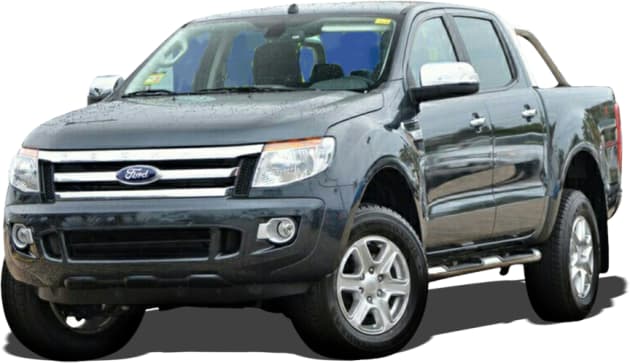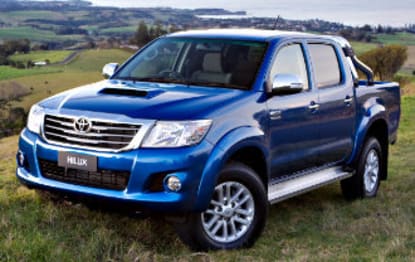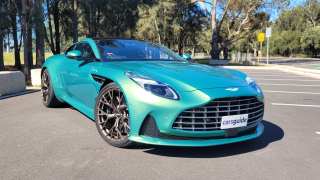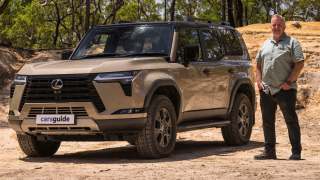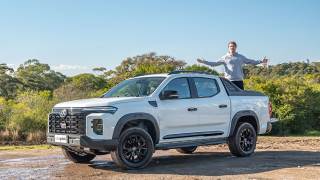
Used Ford Ranger review: 2011-2015
- Ford Ranger
- Ford Ranger 2011
- Ford Ranger 2012
- Ford Ranger 2013
- Ford Ranger 2014
- Ford Ranger 2015
- Ford Ranger Reviews
- Ford Reviews
- Ford Commercial Range
- Ford Ute Range
- Commercial
- Ute
- Ford
- Used Car Reviews
- Towing
What we like
- Safer than older utes
- Comfortable, roomy cabins
What we don't
- Many reports of blown diesel engines
- Multiple recalls
What we like
- Safer than older utes
- Comfortable, roomy cabins
What we don't
- Many reports of blown diesel engines
- Multiple recalls
Released in 2011 the all-new PX Ranger was Ford’s entry into the new-age ute market, and like all new generation utes it came in a wide range of models to suit most needs.
While it was built in Thailand, the PX Ranger was the product of Ford’s Australian design team.
The range of models verged on bewildering. You could have almost any style you wanted, including single, dual and super-cab bodies, cab-chassis or ute, high riding rear-wheel drive, four-wheel drive, and petrol or diesel engines.
Models
There was also a choice of models from basic entry-level to the XLT with every feature you could wish for.
Depending on the model you could carry up to 1271 kg and tow as much as 3350 kg.
The PX model range was made up of the XL, XLT and Wildtrack.
They were available in 4x2 (rear-wheel drive) and 4x4 (four-wheel drive) as a regular cab-chassis, a high-rider cab-chassis, and a pick-up, with the choice of single-cab, extended super-cab, and crew-cab bodies.
It also came with the choice of engines, including a 2.2-litre four-cylinder common-rail turbo-diesel, 2.5-litre four-cylinder petrol engine, and a 3.2-litre five-cylinder turbo-diesel.
There was also choice of a six-speed manual gearbox or a six-speed automatic transmission.
In XL form it boasted dual front airbags, ABS anti-lock braking, emergency brake assistance, digital stability control, traction control, hill holder, automatic headlights, air-conditioning, cruise control, remote keyless central locking, power mirrors, power windows, two-speaker audio, and alloy wheels.
Crew-cabs had the additional safety features of side airbags and head airbags.
The XLT was only available as a 3.2-litre pick-up, with the super-cab or crew-cab bodies, and either Hi-Rider 4x2 rear-wheel drive or 4x4 four-wheel drive.
It came with dual front airbags, side front airbags, head airbags, ABS anti-lock braking, electronic brakeforce distribution, emergency brake assistance, traction control, 17-inch alloy wheels, cruise control, climate control air-conditioning, automatic headlights, remote central locking, power mirrors and windows, six-speaker CD sound, fog lamps, limited slip differential, rain-sensing wipers, alarm, side steps and tow bar.
Sitting pretty atop the range was the Wildtrack, the Ranger with all the fruit.
It was a dual crew-cab 4x4 four-wheel drive pick-up with 3.2-litre common-rail turbo-diesel.

The list of standard features was lengthy. It included 18-inch alloy wheels, six-speaker CD sound, climate control air-conditioning, alarm, USB socket, Bluetooth to connect an Iphone or android device, reversing camera, floor carpets, rear parking sensors, cruise control, power driver’s seat, immobiliser, fog lamps, front cup holders, heated front seats, automatic headlamps, sat nav, rain-sensing wipers, power windows and mirrors, side steps, sports bar, and cloth trim.
For more you have prestige paint, but there was no option of a sunroof, and you couldn’t have park assist.
All models have a full-sized spare tyre.
An XLS model was added to the range in 2013, which slotted in between the XL and XLT. It was 4x4 four-wheel drive, had the 3.2-litre turbo-diesel engine, locking rear differential, and front fog lamps.
In 2014 an XL Plus came on the scene with 17-inch steel wheels, heavy-duty seat covers, a second battery and moulded black bumpers.
Cabin
The number of seats you got depended on the choice of body.

You got three seats in the single-cab, four in the super-cab, and five in the crew-cab.
The cabin was nicely laid-out, comfortable and in most cases roomy.
Rear seat passengers in the super-cab would have found it cramped and uncomfortable; the rear seats were only meant for short trips from job site to job site.
For more comfort the crew-cab was the one to go for; rear seat passengers then found themselves in reasonably comfortable seats, with lap-sash seat belts for safety.
There were a range of storage options, and cupholders were fitted for the convenience of those in the front.
Lap/sash seat belts in the rear of dual-cab models allow the fitment of a baby car seat, and ISOFIX baby car seat mounting points (mandatory from 2014) are fitted.
Engine
All engines in the PX were new to the Ranger, and this time round Ford offered a petrol engine in addition to the turbo-diesels.
The new petrol engine was a 2.5-litre four-cylinder, which when pushed to its peaks produced 122 kW, or 165 horsepower, and 226 Nm.
It was only available in the rear-wheel drive XL cab-chassis, and only with a five-speed manual gearbox.
In addition to the petrol engine there were two turbo-diesels to choose from. Both were common-rail, one was a 2.2-litre four, the other a 3.2-litre with five cylinders.
The smaller diesel delivered 110 kW, or 147 horsepower, and 375 Nm at its performance peaks, the larger one 147 kW and 470 Nm.
While the 2.2-litre turbo-diesel was available in the XL, the XLT and Wildtrack came with the 3.2-litre engine standard.
The transmission options with the turbo-diesel engines were a six-speed manual gearbox or six-speed automatic.
Driving
The PX Ranger while being first and foremost a workhorse does a good job on its many and varied other duties.

With independent front suspension and semi-elliptic leaf spring rear suspension it rides firmly, but still comfortably.
It will carry a sizable load, tow a good-sized caravan, and do it in style.
The 3.2-litre turbo-diesel is the performance king and the best choice for towing.
Safety
Unlike oldtime utes which lacked anything resembling safety features the PX Ranger delivers on the safety front and most models got a five-star tick from ANCAP.
It was only the lower level variants without side airbags that were hit with a four-star slap.
The five-star wonders have a full array of safety features, including dual front airbags, side font airbags, and head airbags, as well as ABS braking, traction control, stability control, emergency brake assistance, electronic brakeforce distribution, hill hold, rollover protection.
Any common issues?
Reports from owners show a widely varying experience with reliability. Some love their cars, but others are less than impressed.

Worryingly, blown 3.2-litre diesel engines are often reported, and at quite low kilometres. Ford has replaced a number of engines under warranty, which makes buying one second hand risky.
With no warranty to fall back on, owners risk having to pay for the replacement engine out of their own pocket.
Those owners who have had an engine blow say they had no warning of the impending meltdown, the first thing they knew the engine was knocking badly, it was emitting white smoke from the exhaust, and it lacked power.
The message to anyone buying one now is to check the oil often, and change it regularly, possibly more frequently than Ford’s recommended 15,000km.
Ford recommends servicing the Ranger every 15,000km or 12 months, but it’s worth changing oil every 10,000km, particularly if the vehicle is working hard or towing.
With a rating to tow 3500kg, the Ranger is going to be a hard worker, so maintenance is crucial. When checking one prior to purchase, ask the vendor for the service book, which will hopefully show a pattern of regular servicing.
It is also essential to check for offroad use. There are plenty that have never seen an unsealed road, let alone a bush track and they are the ones to go for.
There have been a number of recalls with the PX that prospective owners should be aware of.
One related to the possible failure of the output shaft sensor on automatic vehicles causing a sudden downshift to first and possible loss of traction.
Another related to the possibility of the rear seat latch breaking preventing the seat back to be locked in the upright position.
Yet another referred to the possibility of the mounting bolts for the bulbar failing.
It is also essential to check for offroad use. There are plenty that have never seen an unsealed road, let alone a bush track and they are the ones to go for.
Ford introduced capped price servicing to put a lid on service costs in 2014; it applies to all vehicles built after 2007.
The new car warranty was for three-years/100,000km, which means it finally expires for the last examples in 2018.
MORE: If anything crops up, you’ll probably find it on our Ford Ranger problems page.
Owners view
Sam Naismith: My 2012 dual-cab XLT has been very good. It has all the power and tech I want, it’s economical, handles well on the road and is great off it.
Ray Ellis: I was happy with my 2013 dual-cab XLT until the engine blew up at 42,000 km. Suddenly there was white smoke, the engine bay was covered with oil, and the engine was running roughly.
Alan Cross: My 2013 XL Hi-rider just died one day without warning. It needed a new engine.
Paul Johnstone: The engine in my 2012 XLT blew up with no warning. It was serviced regularly and everything appeared normal, but one day it started making a horrible knocking noise and vibrating badly. I’m very disappointed with it.
Barry Scott: The engine in my 2014 XLT was very sluggish. It lacked power and there was no torque, so Ford replaced the engine at 60,000 km. There have been other problems with the injectors, glow plugs, and the new engine has developed a worrying ticking noise. I’m not happy.
Rivals
Toyota Hilux
The perennial favourite is under pressure from all sides, but is still hard to beat for reliability and value.
VW Amarok
A bit of an unknown quantity from a maker that hasn’t previously played in this market.
Nissan Navara
Solid, but uninspiring ute that urges caution on the part of buyers.
Verdict
Tough looks and top tower, but engine problems a concern for used buyers.
Pricing
| Year | Price From | Price To |
|---|---|---|
| 2015 | $10,560 | $47,960 |
| 2014 | $10,230 | $39,160 |
| 2013 | $9,240 | $35,860 |
| 2012 | $8,690 | $34,650 |
| 2011 | $7,810 | $31,240 |
Pricing guides
Range and Specs
| Vehicle | Specs | Price* | |
|---|---|---|---|
| XL (4X2) | 2.5L, Diesel, 5 SP MAN | $8,690 – 12,210 | 2011 Ford Ranger 2011 XL (4X2) Pricing and Specs |
| XL (4X4) | 3.0L, Diesel, 5 SP MAN | $13,860 – 18,260 | 2011 Ford Ranger 2011 XL (4X4) Pricing and Specs |
| XLT (4X2) | 3.0L, Diesel, 5 SP AUTO | $16,170 – 20,680 | 2011 Ford Ranger 2011 XLT (4X2) Pricing and Specs |
| XLT (4X4) | 3.0L, Diesel, 5 SP AUTO | $15,400 – 19,800 | 2011 Ford Ranger 2011 XLT (4X4) Pricing and Specs |
Other cars to consider
$5,950
Lowest price, based on 74 car listings in the last 6 months







